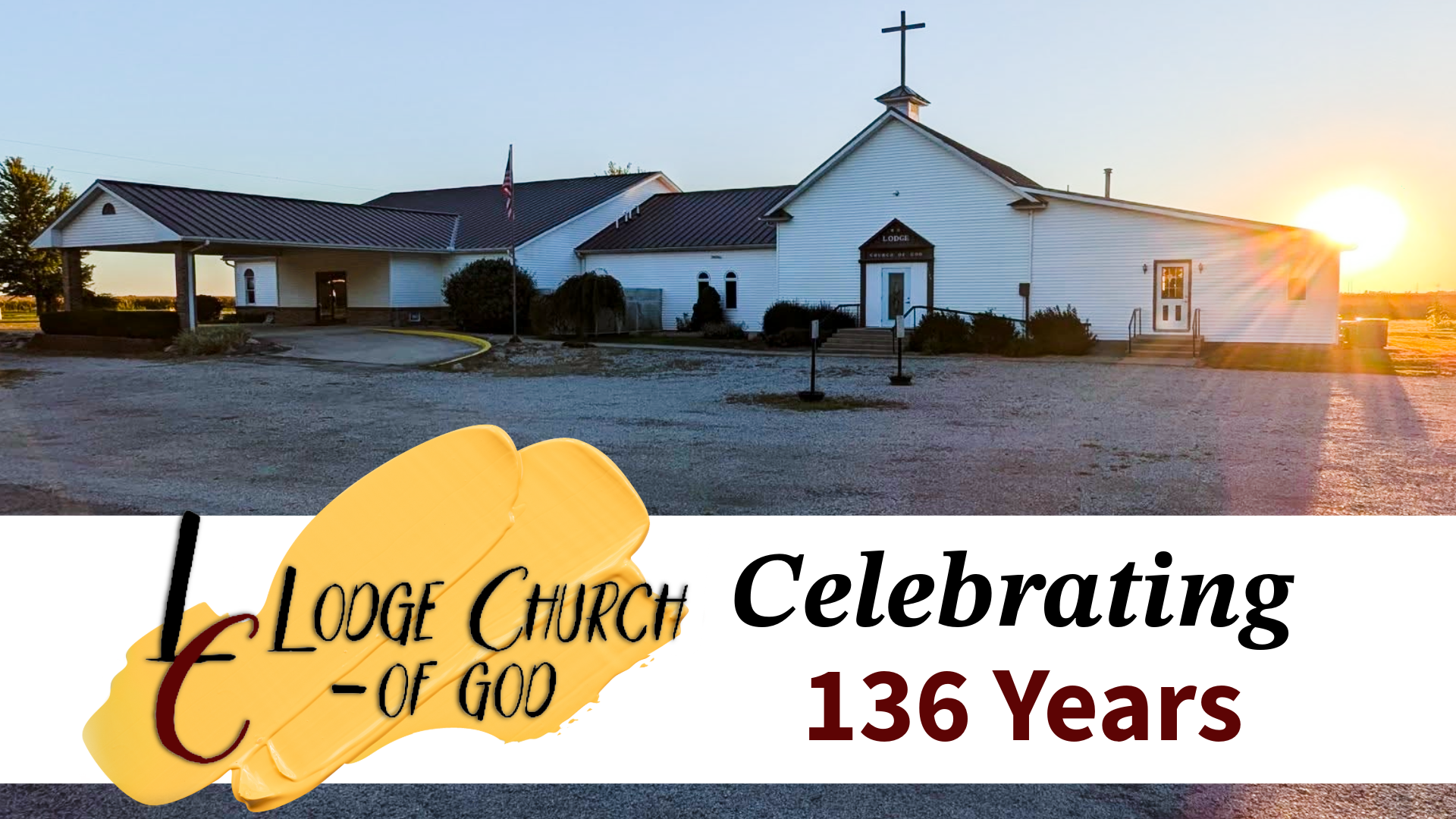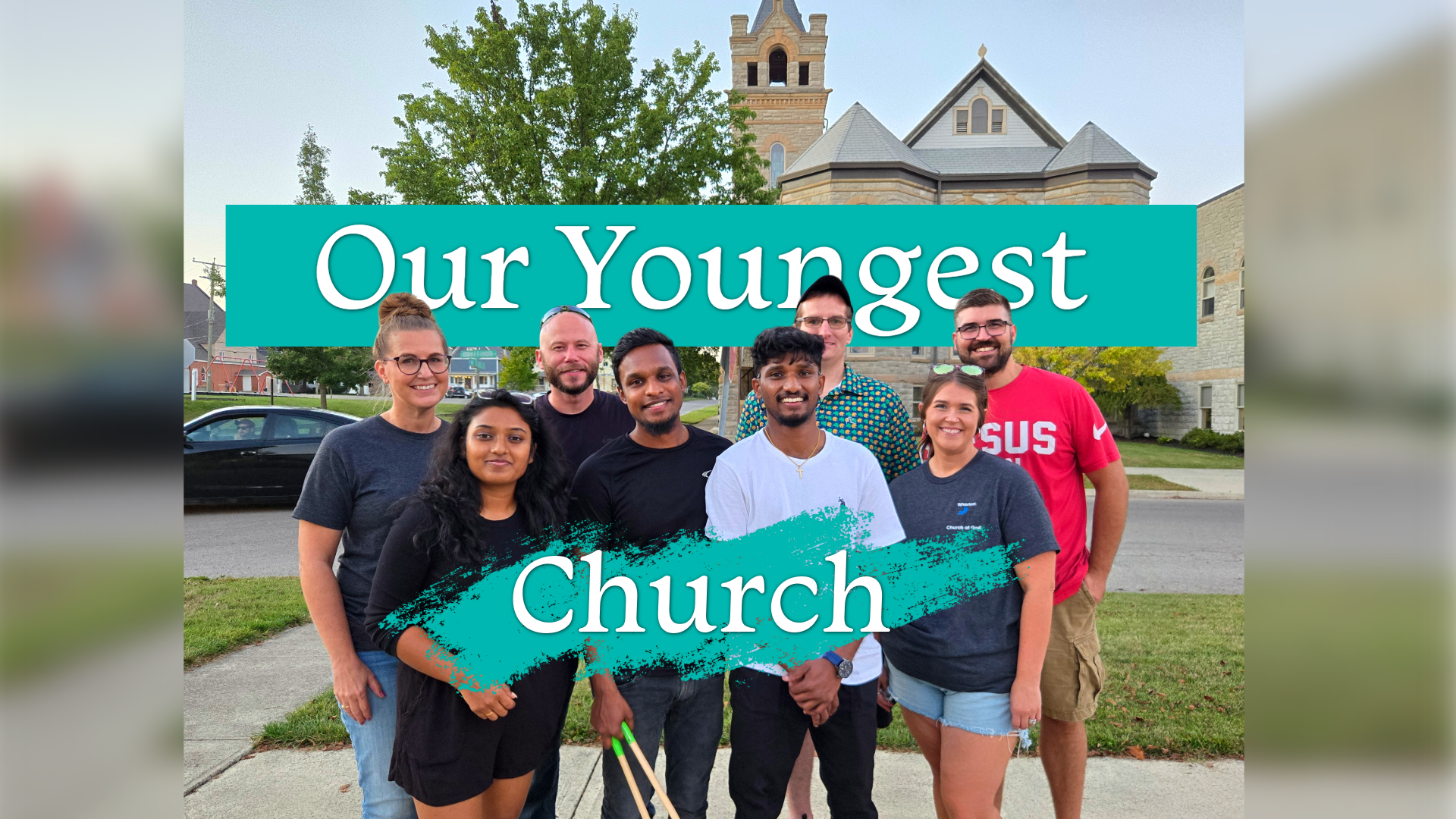
*This blog was originally given as a message at Lodge Church of God, October 5th, 2025*
We’ve had the privilege of being a part of many different celebrations this year. Of course, we’ve celebrated our own Bicentennial in July in Harrisburg, and some of our churches are continuing to celebrate that throughout the year with the showing of our Bicentennial film. Watch here: Watch here!
But many of our churches are celebrating major anniversaries and they’ve been gracious enough to invite members of our office to attend and occasionally to even speak a word.
Our Executive Director, Lance Finley, was invited to partake in the festivities at Urban Light Community Church in Muncie, IN, who recently celebrated their 20th anniversary, and he was also asked to speak at Newville Church of God, this past week to give a message during their 190th celebration service. You can find that here: Watch here!
Likewise, this past week, I was kindly asked to speak at Lodge Church of God in Lodge, Illinois in celebration for their 136th anniversary.
All of these anniversaries, birthdays, and celebrations had me thinking and wrestling with my love of history, and considering how we can properly appreciate our histories and legacies without idolizing them.
I’ve said it before, and I don’t mind repeating it, one of the best parts of my job is the fact that we have a historical archive right here in the office. Diving into the Archive Museum is a regular feature of my week. At some point I need to find a piece of information that only our Archives Museum, under the curation of Jim Marckel and stewarded by the Oversight Committee, can provide.
If I was particularly diligent, I could drop into the archive, rifle through a single filing cabinet, and have the information I need within 5 minutes or less. But, inevitably, I find myself looking through pictures I don’t need, reading documents that won’t be helpful to my goal, and then getting lost in some interpersonal drama between historical people that I only learned existed 5 minutes before.
While I could have spent just 5 minutes in the archive, typically I realize my neck is starting to ache from being craned over a bunch of dusty documents 30 minutes later than I intended, and I have to peel myself away even then.
The point being, I really like history, historical documents, photographs, objects and memorabilia. I often marvel at the great distances of time or daydream a little about what life was like 100 years before I was born.
While in the archive looking around for more information about Lodge Church, I came across a newspaper I didn’t recognize called The Central Churchman, which was produced by the Illinois Eldership/Conference before regionalization, and the issues we have are largely from the mid 1940-1950s. In The Central Churchman are a series of updates from churches in the eldership, typically in the form of a paragraph or two and in the 20-30 issues we have of the periodical, Lodge shows up pretty much every time.
One section from Lodge was of particular interest to me.
In an issue in the 1940s, the pastor of Lodge at the time, Rev. O. R. Bartlett says, “While here Rev. Eakin presented us with our final gold stars for last year’s General Eldership Certificate of Merit. He informed us that we were the only church in the state with more than three stars. We have six. ‘For the people have a mind to work.’ We didn’t get the seventh star because we didn’t have a doctrinal training class. Well, we’re having one now.”
I think that little snippet speaks to the determination of Lodge Church of God to be continually striving for the Lord. Even in their excellence they were willing to embrace critique if it meant discipling their people better, and I told them as much in my message this past weekend.
It’s a wonderful thing to have an archive, full of orderly documents, labeled and filed away properly. There is a strong temptation though to see the past with rose-tinted glasses, always imagining that people had it better in the past, or that they achieved more, struggled less, sinned less, and in general, knew what they were doing and were confident about it.
In short, it’s tempting to think that the past and the people therein were just better.
Personally, there is also a temptation in retelling stories to identify with them, drawing a straight line from the legacy of some organization or person right to ourselves.
I haven’t been a part of the CGGC for very long, especially in comparison to some people. In last week's interview with Pastor Douglas Nolt, he describes himself, saying, “In the words of my friend Bob Eatherton, ‘I was Church of God nine months before I was born.’”
That’s not the case for me, yet even still, I wrestle with legacy often in my roll. For instance, in our publication, The Global Advocate, we love to tell the story of John Winebrenner, our founder who was the incredibly dynamic reformer and revivalist in the church, and who helped put us on the right side of history by being an ardent abolitionist, having strong social views on all kinds of things. His story, and the story of the publications he used to further his goals, are easy to tell and it makes us feel good to talk about Winebrenner, even his controversies. It’s easy in this role to identify with his work, and of the publications we now steward, and feel that we are a part of something greater.
But whenever we find ourselves glorifying the past, or celebrating past achievements, we need to reflect deeply on whether we are really living into that legacy, or not.
We can ask the same question, of course, about Jesus. We love to talk about and identify with Jesus’s willingness to challenge the religious hypocrites of His day, and to speak truth, and to cast out demons, and to bring good news to the people who needed it most, and yet, the question: Am I really willing to suffer the kind of persecution He suffered to do it?
I don’t even like being disagreed with, much less persecuted and martyred, and yet Jesus calls us to be like Him, and we often call ourselves Christians in His name.
What am I doing to reflect the stories that I champion from the past? How am I going to live them out now?
Another way of asking that question is, am I content to talk about these stories, or do I allow them to motivate me to go and do likewise?
The truth is, in our reverence for the past, we’re not called to eulogize our churches or our saints, but in remembering and celebrating them rightly, we’re expected to carry on their legacies further.
In the case of Lodge’s 136th Anniversary, we’re called to put in the kingdom work so there are more Christians around to celebrate new things 136 years from now.
There is no reason why the glories of the past cannot be entirely eclipsed by the power of a movement from God today. A church of 20 years, 136 years, and even 190 years can receive a fresh wind and new life from God, launching them into ministry that doubles their impact and transforms their communities.
The sense of downward momentum that has afflicted the church in the past two decades has made looking in the rearview mirror quite comfortable, but God is not done with us if we are just willing to say “yes” like Abraham to a new and daring adventure.
And Abraham’s story is one I’m continually fascinated with, in part because I also have a strong fascination with age generally.
I frequently remind those in our office that I was a mere child when most of them started working in our office. It’s not uncommon that Lance tells a story about some church event, or some episode in the office, and I really appreciate being able to say, “You know, I wasn’t even born when that happened.”
Abraham though, as recorded in Genesis, hadn’t started his ministry until he was approximately 75 years old. We can assume that Abraham (Abram at the time) and his family almost certainly had some preexisting connection to the Lord. It’s possible he and his family were faithful followers of God, having a long and storied (yet untold) relationship with the Lord. But it’s undeniable that his greatest calling would only arrive at 75 years old.
And when this new calling comes from the Lord, it’s the most audacious and outlandish kind of promise, specifically because Abram is already 75 years old. But Abram simply says yes and obeys.
It’s for this reason that Paul remarks in Galatians 3 that Abraham is the “man of faith.” Though imperfect in myriad ways, and full of selfishness, and certainly impatience, Abraham is the archetype of faith in our tradition. Abraham is a character we can all look to and remember that the Lord can work with and through anyone to bring about His will. All we’re required to do in these days is to say yes.
Of course, God’s promise to Abraham isn’t fulfilled until 25 years later, when he’s 100 or 101 years old. And while my back aches just thinking about being a 100-year-old father to a newborn, it’s a reminder that the Lord can call anyone, at anytime, to do a work greater and more impactful than anything they might have achieved in the past. The glories of the past pale in comparison to the promise that our sovereign God has for the future.
Abraham was 75 when he received his calling from the Lord, and his calling was an amazing calling, but also totally ludicrous for someone who is 75 and doesn’t have any children yet. But that didn’t matter to Abraham.
Regardless of where you are in your life, 40 or 80, or as a church 20, 136, or 190… It is not too late for God to do a new thing in your life or the life of the church.
Celebrate your anniversaries well but be motivated toward an even more prosperous future, knowing that God’s greatest callings on your life may yet be to come.
CGGC eNews—Vol. 19, No. 41





Login To Leave Comment